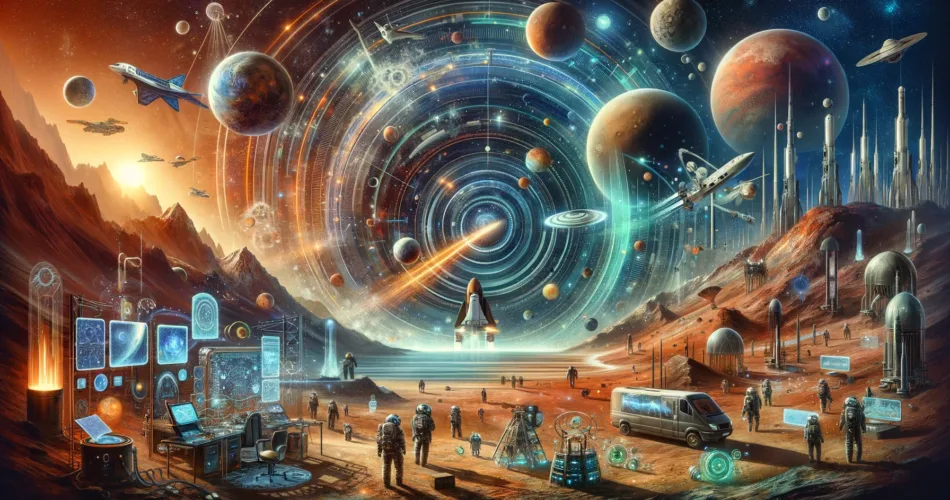The allure of the unknown has always captivated human imagination. There’s something deeply intriguing about exploring uncharted territories, and this fascination is not confined to the realms of our own planet. The idea of venturing into space and colonizing other planets, particularly Mars, has been a subject of both scientific inquiry and popular culture for centuries. In this exploration, we delve into the reasons behind our obsession with Mars, the historical background of our interest, and the technological and logistical challenges that lie ahead.
The Eternal Appeal of the Unknown
The concept of a blank slate, represented by untouched natural landscapes or the vastness of space, ignites our imagination. It presents an opportunity to start anew, to explore and to discover. This intrinsic desire to explore the unknown is what has propelled humanity towards remarkable discoveries and innovations. The dream of colonizing Mars is a modern manifestation of this timeless quest for exploration.
Childhood Dreams to Reality: The Visionaries of Mars Exploration
Elon Musk, the entrepreneur behind SpaceX, exemplifies the transition from childhood fascination with space to actualizing those dreams. Musk’s vision for space exploration and his determination to make interplanetary travel a reality highlight a broader human aspiration to reach beyond our earthly confines. The successful launch of rockets and the ambition to colonize Mars signify a pivotal moment in space exploration, turning science fiction into a potential future reality.
Mars in the Human Imagination: From Fiction to Scientific Pursuit
The fascination with Mars is not new. The 19th-century astronomer Giovanni Schiaparelli and later Percival Lowell contributed to the early intrigue surrounding Mars, mistaking natural formations for evidence of intelligent life. This blend of scientific observation and imaginative speculation fueled a rich tradition of Mars in science fiction, influencing figures like Wernher von Braun, a key figure in the development of rocket technology.
The Technical Realities of Mars Colonization
Colonizing Mars presents a constellation of technical and logistical challenges, from the long and perilous journey through space to the harsh living conditions awaiting on the Martian surface. Issues such as cosmic radiation, the need for sustainable life support systems, and the daunting task of landing safely on Mars underscore the monumental effort required to make Mars a second home for humanity.
Science Fiction Meets Science Fact: Cryogenic Sleep and Martian Habitats
Innovative solutions like cryogenic sleep, inspired by science fiction, are being considered to address the challenges of long-duration space travel. Similarly, the idea of using 3D printers to construct habitats from Martian materials reflects a convergence of imaginative fiction and tangible technological progress.
The Debate over Terraforming and Ethical Considerations
The concept of terraforming Mars – modifying its environment to resemble Earth’s – is a topic of both excitement and ethical debate. While the idea has been popularized in science fiction, the practical and ethical implications of such an endeavor raise significant questions. The vision of transforming Mars into a habitable planet for human settlement pushes the boundaries of our technological capabilities and confronts us with profound moral considerations about our right to alter other worlds.
Conclusion: Mars as a Symbol of Human Aspiration and Limitation
Mars represents the ultimate frontier of human exploration and the potential for a new beginning. Yet, it also serves as a reminder of the limitations of our current technologies and the ethical dilemmas posed by interplanetary colonization. As we stand on the brink of making interplanetary travel a reality, the journey to Mars underscores the importance of balancing our dreams of exploration with a thoughtful consideration of the consequences. The pursuit of Mars colonization is not just a test of human ingenuity but a reflection of our collective values and vision for the future of humanity.
The exploration of Mars invites us to dream big, pushing the boundaries of what is possible. As we continue to advance technologically, the red planet remains a beacon of potential, challenging us to extend the reach of human civilization beyond Earth. The journey ahead is fraught with challenges, but it is precisely these challenges that make the quest so exhilarating. Mars beckons, and humanity is poised to answer the call.

